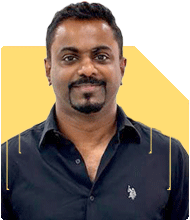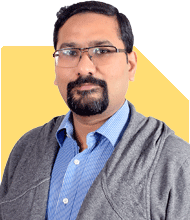Should I Quit My Job and Start a Business?
Rajesh Nair | Answer |Ask -Follow
Hiring, Leadership Expert - Answered on Jun 15, 2024
He has over 20 years of experience in executive recruitment and headhunting across industries both in India and abroad.
He specialises in the senior executive, board and C-level hiring, as well as niche roles in the middle to senior management space.
He has built high-performing teams from scratch by mentoring the them.
Rajesh holds a master's degree in marketing from the university of Mumbai.
... more

Hi gurus, I'm 26 as of now and working in corporate with 30K in-hand salary..But, I don't have any investments of any kind. Most of times my guts tells me to that I'm not made for job but for some kind of sole proprietorship business. Also, I'm not able to think other side income income source as m doing night shift. What should I do??
You need to get some good real experience working before you start something on your own. Starting a business and running the same requires a lot of determination and patience . Would recommend figuring out what type of work gives you maximum satisfaction and stick to the same for a few years.You can start by shifting your job and getting a day job , then you can start exploring other income sources.
You may like to see similar questions and answers below
Aashish Sood |127 Answers |Ask -Follow
CAT, Management Expert - Answered on Nov 02, 2023
Krishna Kumar | Answer |Ask -Follow
Workplace Expert - Answered on Feb 12, 2024
Ramalingam Kalirajan |10870 Answers |Ask -Follow
Mutual Funds, Financial Planning Expert - Answered on May 09, 2024
Adarsh Rai | Answer |Ask -Follow
HR, Leadership coach - Answered on Jul 03, 2025
Dr Shyam Jamalabad |107 Answers |Ask -Follow
Dentist - Answered on Dec 05, 2025
Dr Shyam Jamalabad |107 Answers |Ask -Follow
Dentist - Answered on Dec 05, 2025
Dr Dipankar Dutta |1836 Answers |Ask -Follow
Tech Careers and Skill Development Expert - Answered on Dec 05, 2025
Ulhas Joshi |280 Answers |Ask -Follow
Mutual Fund Expert - Answered on Dec 05, 2025
Dr Dipankar Dutta |1836 Answers |Ask -Follow
Tech Careers and Skill Development Expert - Answered on Dec 04, 2025
Ravi Mittal |676 Answers |Ask -Follow
Dating, Relationships Expert - Answered on Dec 04, 2025
Anu Krishna |1745 Answers |Ask -Follow
Relationships Expert, Mind Coach - Answered on Dec 04, 2025
Anu Krishna |1745 Answers |Ask -Follow
Relationships Expert, Mind Coach - Answered on Dec 04, 2025
Mayank Chandel |2562 Answers |Ask -Follow
IIT-JEE, NEET-UG, SAT, CLAT, CA, CS Exam Expert - Answered on Dec 04, 2025
Mayank Chandel |2562 Answers |Ask -Follow
IIT-JEE, NEET-UG, SAT, CLAT, CA, CS Exam Expert - Answered on Dec 04, 2025






























